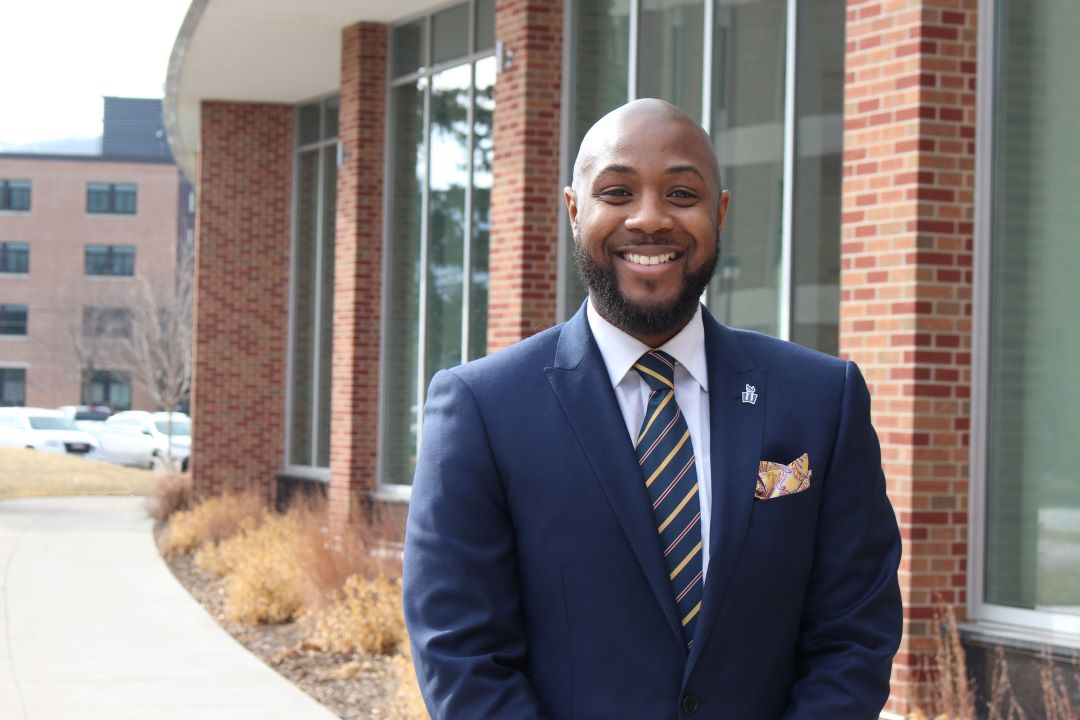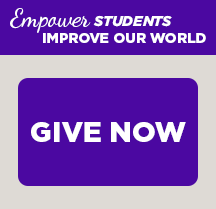
Following the killing of George Floyd in May, there has been renewed energy around the Black Lives Matter movement and making our nation a more just and equitable society. Winona State University stands with the Black community, and all who are marginalized.
We sat down with Associate Vice President for Equity & Inclusive Excellence Jonathan Locust, to hear more about what their office, and the University overall, is doing to act against hate, racism, and bigotry.
What impact have you seen on WSU students and campus community following George Floyd’s killing?
Jonathan Locust (JL): I think it really made people aware, and I think it made people upset. Not only people of color, but a lot of other people were just like “this isn’t right, this shouldn’t be happening.” So, the effect of that awareness has led to more people wanting to figure out what to do.
When I participated in the school protest in Winona, I saw a lot of White students, saw a lot of Black and African students and Hispanic students. I was talking to them, asking if they typically protest, and they’re just like “no, what’s happening is wrong and this is what we’re doing.” I’ve been seeing more of an immediate response of having to do something, and I feel like there’s been more research done by people to figure out what they can do.
Additionally, the awareness piece is not only on the part of students, but on faculty and staff as well. I’ve had conversations with more individuals who are maybe more conservative in nature, finding points in which we can agree on. For example, one professor said, “I think there’s a lot of division, but something that can bring the groups together is agreeing that police should not have militarized weapons.” He talked about his background in hunting and things like that. Well, I didn’t grow up with guns in that context, I grew up with guns around for protection, so they were viewed differently. But these different viewpoints gave us a pathway to start larger conversations on police brutality in the United States against Black people.
Have you had more people on campus reaching out to your office?
JL: There’s definitely been a sharp increase after George Floyd – people just want to do something. A lot of people who have been reaching out saying “I think I kind of get it now”, or “If I don’t get it, I want to get it,” or “I want to figure out how does this stop?” So there’s definitely been a huge increase – and that increase provides opportunity, which is one reason we’re starting Race Matters Study Groups on campus in an effort to organize conversations about hatred, racism, inequity and injustice.
We’re starting small this year, with two groups of faculty and staff members from across campus meeting biweekly over the course of the academic year. The sessions will get into conversations of systemic racism and discrimination, but for the first few weeks, we’ll just spend time getting to know each other. We want people to come in as colleagues and leave as friends, because these topics are extremely difficult to talk about for some people. To be able to provide a foundation for those conversations to sit on – a relationship, I personally believe that it’s going to put our institution lightyears ahead of what other people are doing, because there are going to be so many people on the same page from different backgrounds. This is a place where we can equip people to be advocates, to be allies, and to be able to have conversations to be able to say “you know, this is not right, and this is why it’s not right.” I think it’s going to be powerful.
Another step the University has taken is the creation of the George Floyd Memorial Scholarship. Can you tell us more about it?
JL: Well, for us, it’s just a starting point. As we know, there are gaps in education, gaps in graduation. There are systemic issues, and there are issues with people not being reflected in the curriculum. All of these different things affect educational outcomes, not to mention all the finance issues that students deal with. We know that the gaps we see are not because the students of color or of marginalized identities are not smart enough – it is largely due to problems centered around finances. How do we get to a point where we can start to help people who need that extra push and are doing the right things, but because of systemic issues and all of these different things, their educational outcomes are affected because of that?
The George Floyd Scholarship, as we’re looking at it, is not only a way to address education outcomes, but a way we can actually start to help individuals who we know have the cards stacked against them, and a way for us to level the playing field. This is literally a starting point for us to address the need of more funds and scholarships, and more opportunities for students from underrepresented backgrounds.
Your office was recently renamed the Office of Equity & Inclusive Excellence. What prompted the change?
JL: There are a couple things at play here. First, we’ve seen changes in terminology and approaches nationwide. Second, in order to progress this work, we had to ask ourselves how do we best serve the students we are intending to serve? Focusing not on equality, but on equity – and understanding that our resources may not be distributed evenly, but that’s needed in order to make things equitable.
We worked with Dr. Ryan White and his students in the College of Business to survey campus, as well as the leaders of the KEAP Center, and our new name emerged. But also, the work our office is already doing is in line with this change – one example being bringing the Black barber on campus. We had a group of Black male students who were traveling great distances such as Rochester, The Cities, etc. just to get a haircut of their preference. There is also a culture to Black barbershops, and to bring that on campus, makes the environment more inclusive and more equitable. We’re obviously not saying that White students can’t come, but this is something we’re doing specifically for a population where the need is, because we know there are other students who can find grooming options more easily.
So it’s this type of work, figuring out ways that we can make underrepresented populations feel that they’re a part of campus, that is not only in line with the work already being done by our office, but in line with what the system office is doing, in line with what we’re doing institutionally, and I think it really puts us on the path towards the goal of Equity 2030, making sure we’re looking at things in the right direction.
Where will your office’s efforts go from here?
JL: The way I’m approaching this is process integration – looking at how do we incorporate equity and an equity lens in people’s already existing processes, so it doesn’t make it difficult for them to do it. We’ve found that when we can implement ourselves in peoples’ already existing processes, they’re less likely to say no, we’re more likely to build relationships, and more likely to lead to equitable outcomes. It happened in our work with Dr. White’s class, when his students were developing suggestions they could offer to make our office better, they also had to LEARN about our office. We’ve also instituted intercultural coordinators that act as liaisons with the different academic colleges, so we can be implemented into the processes to know and understand what’s happening at the college level, and where we can provide support.
We also look at it this work from the student perspective, as well as for faculty and staff, programming and the community. We have people who serve on the Human Rights Commission, we have people that serve on the Diversity and Equity Committee for Winona Area Public Schools. I’m working with the Minnesota Rural-Urban Exchange, working with an organization about how we get farmers of color to come to Minnesota. All of these different intersections of diversity and equity are happening more broadly, with the goal that when we bring people here, we’ve made sure there’s a community that they can live in and feel comfortable with.
Simply, we’re trying to involve more people. For one, I think there’s been a focus on the notion that equity work is not just one office’s job, but all of our jobs. And I really believe people are beginning to see it that way. So looking at it in regards to how we involve more people, how do we educate more people, and how do we provide people with the tools to be able to address situations when they go wrong. With Equity 2030 being a state goal, and a goal that not only encompasses higher education, but K-12 as well and other nonprofit and business organizations, I think it makes it easier for people to see themselves a part of it. This is something that we’re all a part of, and overall, I’m hopeful that we will end up better than we were before.

